Martyred Intellectuals: Still not war heroes
The writing was on the wall: They were losing the war.
Sensing its imminent defeat, the Pakistan army and its local collaborators were on a final mission, one that would destroy the future of the new country, maim the nation permanently and rob it of its brightest minds.
In this final act of atrocity, many of the country's intelligentsia were wiped out.
We call them our martyred intellectuals. But these brightest sons and daughters of the soil are not recognised as freedom fighters. Their names are not even included in any government record. Worse, 46 years after independence, the government has yet to make a final list of the intellectuals who were victims of such targeted killing in the final hours of the 1971 Liberation War.
They include university teachers, journalists, litterateurs and doctors, who were targeted not only because of their work in their own fields, but also because of their firm commitment to Bangalee nationalism and Bangladesh.
Since the partition of 1947, they gave a strong intellectual leadership in the secular and democratic movements. And when the Pakistan military began the genocide on March 25, 1971 under "Operation Searchlight", they kept alive the spirit of Bangalee nationalism, many covertly, through their activities.
The nation honours the martyred intellectuals with due respect by observing Martyred Intellectuals' Day every year, but their families think these luminous citizens should be regarded as the freedom fighters.
"It is a shame for the nation. Even so many years after the independence, the martyred intellectuals are not recognised as the freedom fighters," said Roquaiya Hasina Neely, daughter of martyred intellectual SMA Rashidul Hasan.
Rashidul, who taught English at Dhaka University, was picked up from his house and killed on December 14, two days before the victory.
She said the Biranganas (war heroines) and the artistes of Swadhin Bangla Betar Kendra were recognised as freedom fighters, but not her father and other martyred intellectuals.
"The names of the martyred intellectuals were not included in any gazette. There is nothing more unfortunate than this. How would the nation move forward if we cannot give due honour to the people who sacrificed their lives for the country's independence?" she said.
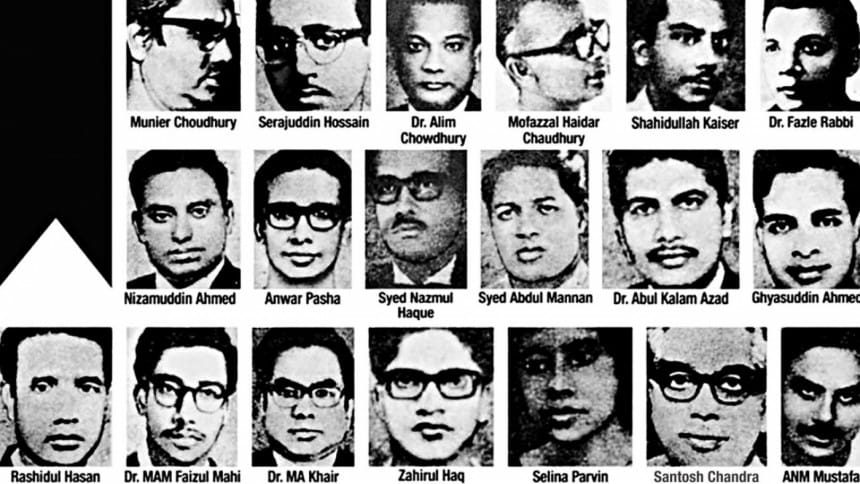
Roquaiya, also noted Tagore artiste, said many families of the martyred intellectuals needed financial assistance.
"Maybe my family doesn't need any help, but what about the families that need help? How would the families seek assistance or how would the government offer help if their names are not in any record, such as a gazette?" she asked.
Al-Badr, mostly comprising the members of Jamaat-e-Islami's student wing Islami Chhatra Sangha, intensified its atrocities in December. It systematically rounded up teachers, writers, doctors, lawyers, journalists and other professionals from their houses in Dhaka, tortured and killed them en masse and dumped the bodies at different killing grounds.
According to Banglapedia, around 991 academics, 13 journalists, 49 physicians, 42 lawyers and 16 other intellectuals were killed during the war.
Among them were journalists Serajuddin Hossain, Syed Najmul Haque, ANM Golam Mostafa, Nizam Uddin Ahmed, Selina Parvin, Shahidullah Kaiser, Dhaka University professors Giasuddin Ahmed, Sirajul Haque Khan, Dr Abul Khayer, Dr Faizul Mohiuddin, Rashidul Hasan, Anwar Pasha, Santosh Chandra Bhattacharyya, Munier Chowdhury and Mofazzal Haidar Choudhury, physicians Mohammad Martuza and Fazle Rabbi.
Tawheed Reza Noor, son of martyred journalist Serajuddin Hossain, said it was unfortunate that the martyred intellectuals were still not given state recognition.
Their contribution should be seen from as far back as 1947 since when they played a crucial role in the secular and democratic movement, he pointed out.
After the Pakistan army swooped on the unarmed Bangalees on March 25, 1971, this group of people continued to play their active role in moving forward the battle, said Tawheed, founding general secretary of Projonmo '71, a platform of children of the martyrs in the war.
"It is essential to give state recognition to the martyred intellectuals as they are the people who inspired the nation to dream big and helped people to go in the right direction with their farsightedness," he added.
Tawheed's father Serajuddin was news editor of the then leading Bangla national daily Ittefaq. He became the target of the local collaborators for his write-ups on the sufferings inflicted on unarmed civilians through the atrocities committed by the collaborators of the Pakistan army.
Rabiul Aftab, son of Anwar Pasha, a professor of Bangla at Dhaka University, said the contribution of the martyred intellectuals to the nation could not be compared with that of any other group, and that they should get due honour.
Anwar Pasha wrote "Rifle, Roti, Aurat", the first novel on Liberation War, between April and June in 1971. He was picked up from his home on December 14 and then killed.
Contacted, Liberation War Affairs Minister AKM Mozammel Haque said most people of the country had contribution in the 1971 war, but they all cannot be recognised as freedom fighters.
"They are the martyred intellectuals; they are respectable persons and the nation respects them. But the government does not have any plan to give them freedom fighters' status," he told The Daily Star.
About a list of martyred intellectuals, the minister said they were yet to complete it as many districts could not send the list.
"We hope that we will be able to complete it before March 26 next year," Mozammel Haque said.


 For all latest news, follow The Daily Star's Google News channel.
For all latest news, follow The Daily Star's Google News channel. 

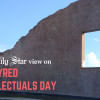
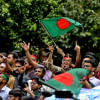
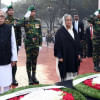
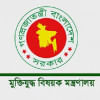
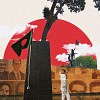


Comments